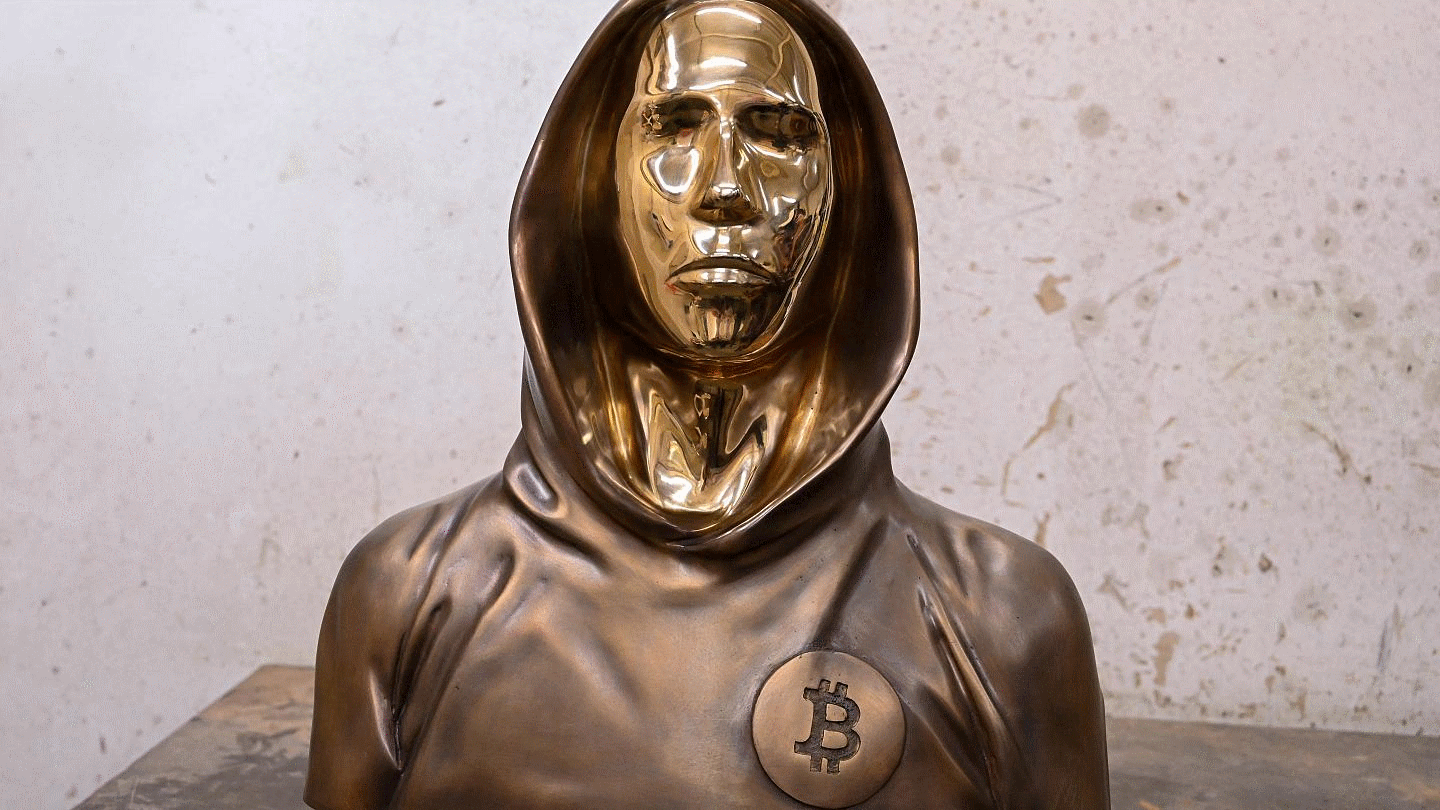IMAGE SOURCE
There have been a few interesting stories in the news this week.
In Budapest, there is a statue of the mysterious Satoshi Nakamoto. The statue has a plain face, wrapped in a bronze hoodie that is marked with the bitcoin logo. When people look at the statue’s face, because it is heavily polished to make it reflective, they see their own faces mirrored back at them. Anyone may be Satoshi. Well, not anymore. A few days ago, a US court ruled in favor of Craig Wright against the family of the late David Kleiman, his business partner, and computer forensics expert, which claimed that together they co-created bitcoin. Wright who has been claiming for years to be the inventor of bitcoin is now entitled to Satoshi’s fortune, 1.1 million bitcoin mined, worth around $50 billion. Many in the crypto community are skeptical of Wright’s claim, in part because he has not moved any of the early bitcoin mined by Satoshi. He might be Nakamoto but he also might not, it remains to be seen. The truth is, who cares anymore if Craig Wright is Satoshi? If he is we certainly appreciate his vision. But bitcoin is open source and everyone can contribute to improving it and many have over the last 13 years, putting it on a course far beyond a single person’s effort.
This week, Capitol Hill warmed up to crypto.
The chiefs of six cryptocurrency companies testified before the House Financial Services Committee about the promises and perils of crypto assets. It’s the first time legislators called crypto CEOs in this way, indicating the industry’s maturity and the threats that regulators see in its rise. Stablecoin regulation was front and center at a Congressional hearing.
What was evident during the hearing was the partisan divide about how to regulate crypto. Democrats’ questions focused on what they called a lack of investor protection in markets for digital assets and the potential for volatility in crypto markets to destabilize the broader economy, while Republicans focused on the technology’s potential to lower costs for financial services and create a decentralized internet that shifts power from big tech firms to everyday Americans.
The crypto market has exploded to more than $2 trillion and Congress is trying to figure out to regulated it. The general sentiment of the hearing was positive, a major shift from past years, reflecting an evolving view of the benefits of cryptocurrency and the fear that the US is falling behind other countries like China that have made noticeable strides towards launching its CBDC. This was just the beginning and we can certainly expect more to come soon.
The crypto industry needs regulation. But will regulation or the real Satoshi make crypto safer?
If you didn’t buy Bitcoin in 2013 before its price hit $1,000 or in 2020 when it passed the $10,000 mark, you’re probably kicking yourself. But you can’t turn back time. In a few years from now, some of you will still be kicking yourselves because you didn’t but at $50K, because you thought it way too expensive. Remember you can buy as many fractions of a bitcoin as you want or as little as you want. You don’t have to buy a whole bitcoin and the same goes for any crypto.
But more importantly, when you do get around to buying bitcoin, you need to think about how to keep it safe.
In 2021, $10.5 billion worth of crypto was lost due to theft and fraud. Compared to the $1.5 billion stolen last year, this represents an increase of 600%. According to a recent report by Elliptic investors lost billions to criminals with the majority stolen from decentralized finance platforms.
Cash has poured into Defi projects this year, mirroring the explosion of interest in cryptocurrencies as a whole. Over the last two years, the total amount of money deposited at Defi projects has spiked from just $500 million to $247 billion. As expected, this has attracted a lot of scammers and hackers who exploit bugs in the code and design flaws to bleed millions of investors’ funds and launder the proceeds while leaving few traces.
Cryptocurrencies can be frightening and complex for new users, and wallet software, being a gateway to owning crypto, should be as simple as possible without sacrificing security. Unfortunately, many are startups with relatively immature cybersecurity, and the irreversible nature of crypto transactions makes things very challenging.
While everyone makes claims that they have made crypto simple, the reality is that when you use their product it is not true, or it’s limited to a narrow use case. There are many ways to invest in crypto, but the majority of crypto activity takes place through exchanges. Leaving your crypto with custodian exchanges may sound simple and safe, and you may feel like you own the crypto stored on these platforms, but you don’t. It’s an illusion.
Crypto is going to continue to grow and will also continue to be stolen by hackers. Sooner or later, an attack on your crypto assets is inevitable. So if you want to HODL your crypto assets for the long run, it is imperative to adopt pro-active preventative measures. Don’t leave your crypto anywhere that is connected to the internet and don’t trust centralized services with custody of your coins. Owning your crypto means that your funds are on-chain, controlled by you, and available only to you.
There are plenty of options in the market (hardware wallets, multi-sig wallets, mobile non-custodial wallets, MPC wallets), each with its pros and cons. Most importantly use common sense and apply basic security principles (2FA, biometrics).
Bitcoin and cryptocurrencies are here to stay, so get your bitcoin, make sure to understand it better, and keep it safe. We should expect the US to embrace cryptocurrencies in 2022, capital flows into the market to continue, and wider adoption to prevail. But, investing in this space, is risky. If you are afraid of risks and don’t spend time to get some basic knowledge you shouldn’t do it. It is still a very volatile market and there are undoubtedly still a lot of people trying to scam others. If you are not very cautious and you don’t know how to manage your risks and keep your assets secure it is not a good space to be in.
There have been a few interesting stories in the news this week.
In Budapest, there is a statue of the mysterious Satoshi Nakamoto. The statue has a plain face, wrapped in a bronze hoodie that is marked with the bitcoin logo. When people look at the statue’s face, because it is heavily polished to make it reflective, they see their own faces mirrored back at them. Anyone may be Satoshi. Well, not anymore. A few days ago, a US court ruled in favor of Craig Wright against the family of the late David Kleiman, his business partner, and computer forensics expert, which claimed that together they co-created bitcoin. Wright who has been claiming for years to be the inventor of bitcoin is now entitled to Satoshi’s fortune, 1.1 million bitcoin mined, worth around $50 billion. Many in the crypto community are skeptical of Wright’s claim, in part because he has not moved any of the early bitcoin mined by Satoshi. He might be Nakamoto but he also might not, it remains to be seen. The truth is, who cares anymore if Craig Wright is Satoshi? If he is we certainly appreciate his vision. But bitcoin is open source and everyone can contribute to improving it and many have over the last 13 years, putting it on a course far beyond a single person’s effort.
This week, Capitol Hill warmed up to crypto.
The chiefs of six cryptocurrency companies testified before the House Financial Services Committee about the promises and perils of crypto assets. It’s the first time legislators called crypto CEOs in this way, indicating the industry’s maturity and the threats that regulators see in its rise. Stablecoin regulation was front and center at a Congressional hearing.
What was evident during the hearing was the partisan divide about how to regulate crypto. Democrats’ questions focused on what they called a lack of investor protection in markets for digital assets and the potential for volatility in crypto markets to destabilize the broader economy, while Republicans focused on the technology’s potential to lower costs for financial services and create a decentralized internet that shifts power from big tech firms to everyday Americans.
The crypto market has exploded to more than $2 trillion and Congress is trying to figure out to regulated it. The general sentiment of the hearing was positive, a major shift from past years, reflecting an evolving view of the benefits of cryptocurrency and the fear that the US is falling behind other countries like China that have made noticeable strides towards launching its CBDC. This was just the beginning and we can certainly expect more to come soon.
The crypto industry needs regulation. But will regulation or the real Satoshi make crypto safer?
If you didn’t buy Bitcoin in 2013 before its price hit $1,000 or in 2020 when it passed the $10,000 mark, you’re probably kicking yourself. But you can’t turn back time. In a few years from now, some of you will still be kicking yourselves because you didn’t but at $50K, because you thought it way too expensive. Remember you can buy as many fractions of a bitcoin as you want or as little as you want. You don’t have to buy a whole bitcoin and the same goes for any crypto.
But more importantly, when you do get around to buying bitcoin, you need to think about how to keep it safe.
In 2021, $10.5 billion worth of crypto was lost due to theft and fraud. Compared to the $1.5 billion stolen last year, this represents an increase of 600%. According to a recent report by Elliptic investors lost billions to criminals with the majority stolen from decentralized finance platforms.
Cash has poured into Defi projects this year, mirroring the explosion of interest in cryptocurrencies as a whole. Over the last two years, the total amount of money deposited at Defi projects has spiked from just $500 million to $247 billion. As expected, this has attracted a lot of scammers and hackers who exploit bugs in the code and design flaws to bleed millions of investors’ funds and launder the proceeds while leaving few traces.
Cryptocurrencies can be frightening and complex for new users, and wallet software, being a gateway to owning crypto, should be as simple as possible without sacrificing security. Unfortunately, many are startups with relatively immature cybersecurity, and the irreversible nature of crypto transactions makes things very challenging.
While everyone makes claims that they have made crypto simple, the reality is that when you use their product it is not true, or it’s limited to a narrow use case. There are many ways to invest in crypto, but the majority of crypto activity takes place through exchanges. Leaving your crypto with custodian exchanges may sound simple and safe, and you may feel like you own the crypto stored on these platforms, but you don’t. It’s an illusion.
Crypto is going to continue to grow and will also continue to be stolen by hackers. Sooner or later, an attack on your crypto assets is inevitable. So if you want to HODL your crypto assets for the long run, it is imperative to adopt pro-active preventative measures. Don’t leave your crypto anywhere that is connected to the internet and don’t trust centralized services with custody of your coins. Owning your crypto means that your funds are on-chain, controlled by you, and available only to you.
There are plenty of options in the market (hardware wallets, multi-sig wallets, mobile non-custodial wallets, MPC wallets), each with its pros and cons. Most importantly use common sense and apply basic security principles (2FA, biometrics).
Bitcoin and cryptocurrencies are here to stay, so get your bitcoin, make sure to understand it better, and keep it safe. We should expect the US to embrace cryptocurrencies in 2022, capital flows into the market to continue, and wider adoption to prevail. But, investing in this space, is risky. If you are afraid of risks and don’t spend time to get some basic knowledge you shouldn’t do it. It is still a very volatile market and there are undoubtedly still a lot of people trying to scam others. If you are not very cautious and you don’t know how to manage your risks and keep your assets secure it is not a good space to be in.

Ilias Louis Hatzis
Ilias Louis Hatzis is the Founder & CEO at Mercato Blockchain Corporation AG.
Ilias Louis Hatzis is the founder and CEO at Kryptonio wallet. Create your wallet in less than a minute, without seed phrases, private keys, passwords or documents. Keep your bitcoin and digital assets always secure and recoverable: https://kryptonio.com
I have no positions or commercial relationships with the companies or people mentioned. I am not receiving compensation for this post.
Ilias Louis Hatzis is the founder and CEO at Kryptonio wallet. Create your wallet in less than a minute, without seed phrases, private keys, passwords or documents. Keep your bitcoin and digital assets always secure and recoverable: https://kryptonio.com
I have no positions or commercial relationships with the companies or people mentioned. I am not receiving compensation for this post.
Autres articles
-
Revolut obtient une licence bancaire au Royaume-Uni
-
Nominations | Eight Advisory annonce deux nouveaux associés en France
-
NFT : L'Opéra de Paris dévoilera à la rentrée une nouvelle collection d'art numérique
-
Ferrari étend son système de paiement en crypto-monnaie à l'Europe après son lancement aux États-Unis
-
WEB3 : L'Europe, le baby-blues des licornes ?

















